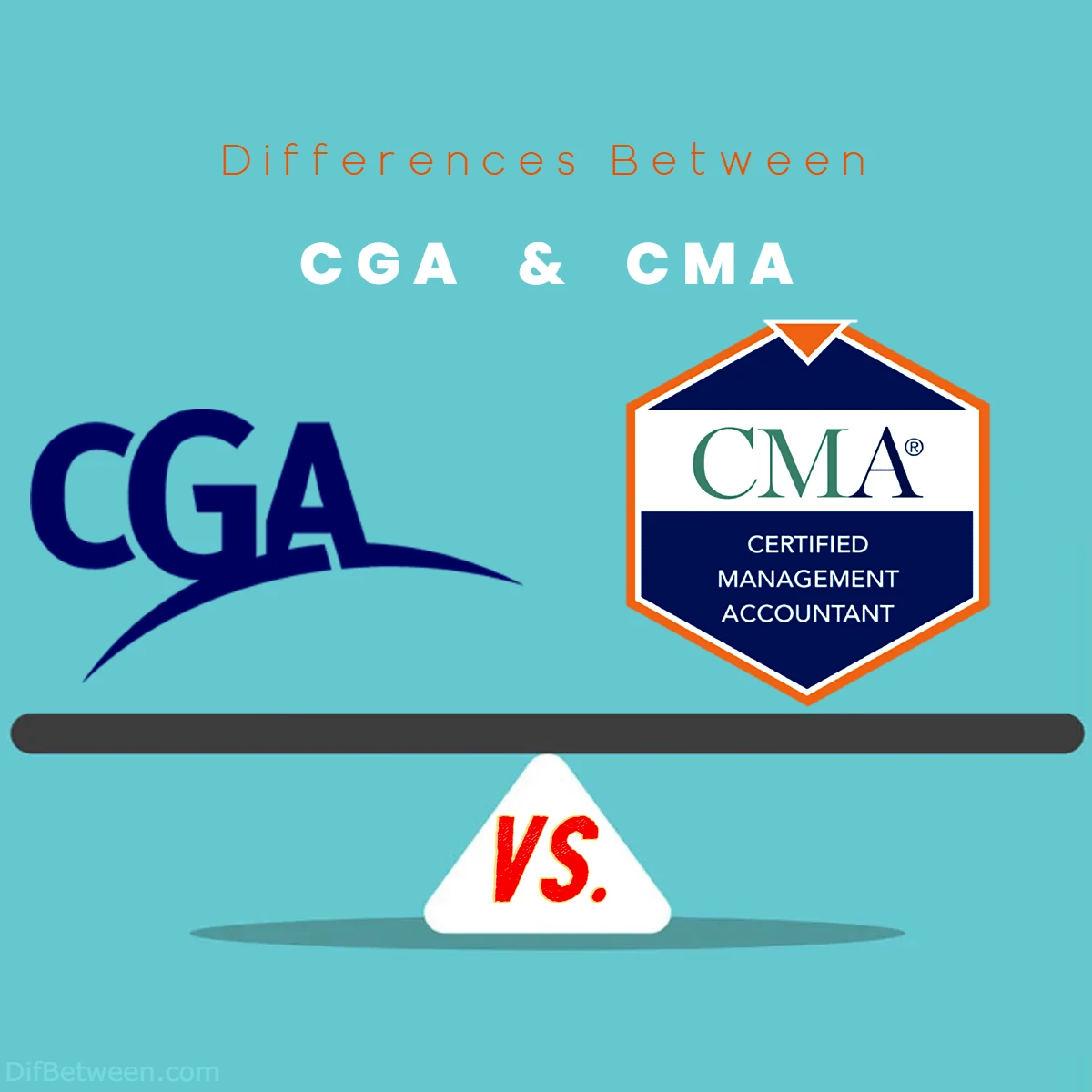
| Aspect | CGA | CMA |
|---|---|---|
| Career Focus | Versatile, covers various areas of accounting and finance. | Specializes in management accounting, financial management, and strategic planning. |
| Educational Requirements | Bachelor’s degree in any field, with potential prerequisite courses. | Bachelor’s degree from an accredited institution, no specific field required. |
| Exam Structure and Certification | Series of exams at each academic level, followed by the Common Final Examination (CFE). | Two-part examination process: the CMA Entrance Exam and the CMA Exam. |
| Ongoing Requirements | Continuing Professional Development (CPD) and membership in provincial CGA associations. | Continuing education (CPE) and membership in the Institute of Management Accountants (IMA). |
| Professional Associations | Provincial CGA associations and Chartered Professional Accountants of Canada (CPA Canada). | Institute of Management Accountants (IMA). |
| Global Recognition | Historically recognized mainly in Canada. | Internationally recognized, especially in the United States and select Asian countries. |
| Specializations | Broad accounting knowledge and skills. | Specializes in cost management, budgeting, performance evaluation, and strategic financial planning. |
| Career Opportunities | Roles include financial analysts, tax consultants, auditors, controllers, and more. | Often found in executive positions such as CFO or Controller, management accounting, financial analysis, and consulting roles. |
| Salary Expectations | Competitive salaries with potential for growth. | Competitive salaries, particularly in senior management positions. |
The distinctions between these two designations may hold the key to unlocking your dream career in the financial world. Whether you’re an aspiring accountant or an employer seeking the perfect candidate, understanding these differences is paramount. So, stay with us as we unravel the intricacies of CGA and CMA, and by the end, you’ll be well-equipped to make an informed choice that could shape your future.
Differences Between CGA and CMA
The primary differences between CGA (Certified General Accountant) and CMA (Certified Management Accountant) certifications lie in their career focus and educational requirements. CGA offers a versatile skill set, covering various aspects of accounting and finance, making it suitable for a broad range of roles. On the other hand, CMA specializes in management accounting, financial management, and strategic planning, making it ideal for those aiming for executive positions or roles that require strategic financial decision-making. These distinctions, along with factors like ongoing requirements and global recognition, should guide your choice between CGA and CMA.
1. Overview of CGA and CMA
CGA:
History and Evolution
The Certified General Accountant (CGA) designation has a rich history dating back to 1908 in Canada. It was originally known as the Dominion Association of Chartered Accountants and later underwent several name changes before becoming the CGA designation in 2008. CGAs have traditionally played a significant role in the public accounting sector, providing services like auditing and taxation.
Core Competencies
The CGA program primarily focuses on equipping professionals with comprehensive accounting knowledge. CGAs are well-versed in financial accounting, management accounting, taxation, auditing, and business strategy. This makes them versatile professionals capable of handling various accounting and finance-related tasks.
CMA:
History and Evolution
The Certified Management Accountant (CMA) designation, on the other hand, has its roots in the United States. It was established in 1972 by the Institute of Management Accountants (IMA). CMAs are known for their expertise in management accounting, financial management, and strategic planning.
Core Competencies
CMAs are specialists in management accounting and financial management. They excel in cost management, performance evaluation, financial planning, and risk management. CMAs often work closely with management teams to make critical financial decisions that impact the organization’s strategic direction.
2. Educational Requirements
CGA:
Academic Qualifications
To pursue the CGA designation, candidates typically need a bachelor’s degree or equivalent in any field. Additionally, some provinces in Canada require candidates to complete specific prerequisite courses before entering the CGA program.
Program Structure
The CGA program consists of a combination of academic courses and practical experience. Candidates complete four academic levels and three years of practical experience in accounting or related fields. The program covers a wide range of accounting and finance topics.
CMA:
Academic Qualifications
To become a CMA, candidates generally need a bachelor’s degree from an accredited university or college. While there is no specific field of study required, degrees in accounting, finance, or business administration are common choices.
Program Structure
The CMA program is divided into two parts: the CMA Entrance Exam and the CMA Professional Program. The entrance exam assesses candidates’ knowledge in accounting, economics, and finance. Once they pass this exam, they move on to the Professional Program, which consists of advanced coursework in management accounting and financial management.
3. Examination and Certification
CGA:
Exam Structure
The CGA program includes a series of exams at each academic level. These exams test candidates’ knowledge of accounting principles, taxation, auditing, and more. The final step is the Common Final Examination (CFE), which assesses candidates’ ability to apply their knowledge to real-world scenarios.
Passing Criteria
To become a CGA, candidates must pass all required exams, including the CFE. The passing score for the CFE varies from year to year and is determined by the CGA association.
CMA:
Exam Structure
The CMA program has a two-part examination process. The first part is the CMA Entrance Exam, which consists of multiple-choice questions and two essay questions. The second part is the CMA Exam, which includes multiple-choice questions and two essay questions. The exams focus on topics such as financial planning, performance management, and strategic financial management.
Passing Criteria
To earn the CMA designation, candidates must pass both the CMA Entrance Exam and the CMA Exam. The passing score for each exam is determined by the IMA.
4. Career Opportunities
CGA:
Industries and Roles
CGAs have a wide range of career opportunities. They can work in public accounting firms, government agencies, non-profit organizations, and private corporations. Common roles for CGAs include financial analysts, tax consultants, auditors, and controllers.
Salary Expectations
The salary of a CGA can vary depending on factors such as location, experience, and industry. However, CGAs often earn competitive salaries, with the potential for significant increases as they gain more experience and move into senior roles.
CMA:
Industries and Roles
CMAs are particularly well-suited for roles that require a deep understanding of financial management and strategic planning. They are often found in executive positions such as Chief Financial Officer (CFO) or Controller. CMAs also work in management accounting, financial analysis, and consulting roles.
Salary Expectations
CMAs tend to command higher salaries compared to many other accounting and finance professionals due to their specialized knowledge in financial management. Salaries for CMAs can be quite lucrative, especially in senior management positions.
6. Ongoing Requirements
CGA:
Continuing Professional Development (CPD)
After obtaining the CGA designation, professionals are required to engage in continuing professional development (CPD) to stay current in the field. CPD involves completing a specified number of hours of education and training each year to ensure that CGAs remain up-to-date with the latest developments in accounting and related areas.
Membership Associations
CGAs are typically members of provincial CGA associations. These associations provide support, networking opportunities, and access to resources for CGAs throughout their careers. CGAs may also have obligations to fulfill as members of these associations.
CMA:
Continuing Education
CMAs are required to engage in continuing education to maintain their certification. This includes completing a specified number of continuing professional education (CPE) credits each year. CMAs must stay informed about changes in accounting standards and best practices.
Membership Associations
CMAs are members of the Institute of Management Accountants (IMA), the organization responsible for granting the CMA designation. The IMA provides resources, networking opportunities, and access to a global community of management accountants.
7. Professional Associations
CGA:
Provincial Associations
CGAs in Canada are typically members of their respective provincial CGA associations. Each province has its own association, which provides support, guidance, and resources to CGAs in that region. These associations may also regulate CGA professionals in their jurisdictions.
National Association
The CGA designation was unified under the Chartered Professional Accountants of Canada (CPA Canada) in 2013. CGAs in Canada became part of the larger CPA Canada organization, which represents all Canadian accountants, including Chartered Accountants (CAs) and Certified Management Accountants (CMAs).
CMA:
Institute of Management Accountants (IMA)
The IMA is the global association responsible for the CMA designation. It provides support and resources to CMAs worldwide. The IMA is known for its commitment to advancing the management accounting profession and offers valuable networking opportunities for its members.
Global Recognition
The CMA designation is recognized internationally, making it a valuable credential for professionals looking to work in various countries. CMAs can often find opportunities to work abroad, given the global recognition of the certification.
8. Global Recognition
CGA:
Limited International Recognition
Historically, the CGA designation has been primarily recognized in Canada. While CGAs possess strong accounting knowledge and skills, the certification may not have the same level of global recognition as some other accounting designations.
CMA:
Strong International Recognition
The CMA designation has gained significant international recognition, especially in the United States and various countries in Asia. CMAs are often sought after for their expertise in management accounting, financial planning, and strategic decision-making.
9. Specializations
CGA:
General Accounting Skills
CGAs are well-rounded professionals with expertise in various accounting areas, including financial accounting, taxation, auditing, and business strategy. They are prepared for a wide range of accounting roles.
CMA:
Management Accounting Specialization
CMAs specialize in management accounting and financial management. They excel in cost management, budgeting, performance evaluation, and strategic financial planning. Their focus is on helping organizations make informed financial decisions.
CGA or CMA: Which One is Right Choose for You?
Choosing between the Certified General Accountant (CGA) and Certified Management Accountant (CMA) certifications is a significant decision that can shape your career in accounting and finance. To help you make an informed choice, let’s delve deeper into the key factors to consider when deciding which designation aligns best with your career aspirations.
1. Career Focus
CGA:
- CGAs are well-rounded professionals with expertise in various accounting areas, including financial accounting, taxation, auditing, and business strategy.
- They are suited for a broad spectrum of roles, making them versatile assets in the world of accounting.
CMA:
- CMAs specialize in management accounting and financial management.
- Their focus is on cost management, budgeting, performance evaluation, and strategic financial planning.
- CMAs often excel in roles that require strategic decision-making, such as Chief Financial Officer (CFO) or Controller.
Consideration: If you are inclined towards management accounting, financial strategy, and executive roles, the CMA designation may be the better fit. However, if you prefer a broader range of accounting roles, CGA might be the right choice for you.
2. Educational Requirements
CGA:
- Typically requires a bachelor’s degree or equivalent in any field.
- Some provinces in Canada may require specific prerequisite courses before entering the CGA program.
CMA:
- Requires a bachelor’s degree from an accredited institution.
- While there’s no specific field of study required, degrees in accounting, finance, or business administration are common choices.
Consideration: Ensure that you meet the educational prerequisites for the certification program you are interested in pursuing.
3. Exam Structure and Certification
CGA:
- The CGA program includes a series of exams at each academic level, testing knowledge in various accounting areas.
- The final step is the Common Final Examination (CFE), which assesses candidates’ ability to apply their knowledge to real-world scenarios.
CMA:
- The CMA program consists of a two-part examination process: the CMA Entrance Exam and the CMA Exam.
- Exams focus on topics such as financial planning, performance management, and strategic financial management.
Consideration: Understand the exam structure and passing criteria for the certification you intend to pursue.
4. Ongoing Requirements
CGA:
- Requires continuing professional development (CPD) to stay current in the field, including a specified number of hours of education and training each year.
- CGAs are typically members of provincial CGA associations, which provide support and resources.
CMA:
- CMAs must engage in continuing education to maintain their certification, including completing a specified number of continuing professional education (CPE) credits annually.
- CMAs are members of the Institute of Management Accountants (IMA), offering access to global resources and a professional community.
Consideration: Evaluate your commitment to ongoing professional development and consider the support offered by the associated professional associations.
5. Global Recognition
CGA:
- Historically, the CGA designation has primarily been recognized in Canada.
CMA:
- The CMA designation has gained significant international recognition, especially in the United States and various countries in Asia.
Consideration: If you have ambitions to work internationally, the CMA designation’s global recognition may be advantageous.
6. Long-Term Commitment
Both certifications require a long-term commitment to professional development, adherence to ethical standards, and maintaining your certification status.
Consideration: Assess your willingness to commit to these requirements throughout your career.
In conclusion, your choice between CGA and CMA should align with your career goals, educational background, and personal preferences. Carefully evaluate these factors, and consider seeking guidance from professionals who hold these designations to gain insights into their respective career paths. Remember that both CGA and CMA certifications can lead to rewarding and successful careers in the world of finance and accounting. Your decision should reflect your unique aspirations and strengths.
FAQs
The main difference lies in their career focus. CGA is versatile, covering various aspects of accounting and finance, while CMA specializes in management accounting, financial management, and strategic planning.
Yes, there are educational prerequisites. CGA typically requires a bachelor’s degree in any field, while CMA requires a bachelor’s degree from an accredited institution, with no specific field required.
CGA involves a series of exams at different academic levels, followed by the Common Final Examination (CFE). CMA has a two-part examination process, starting with the CMA Entrance Exam and followed by the CMA Exam.
CGA requires Continuing Professional Development (CPD) and membership in provincial CGA associations, while CMA mandates continuing education (CPE) and membership in the Institute of Management Accountants (IMA).
CMA is internationally recognized, especially in the United States and select Asian countries, whereas CGA historically has more regional recognition, primarily in Canada.
CGAs can work in roles such as financial analysts, tax consultants, auditors, and controllers. CMAs often excel in executive positions like Chief Financial Officer (CFO), management accounting, financial analysis, and consulting roles.
Read More:





